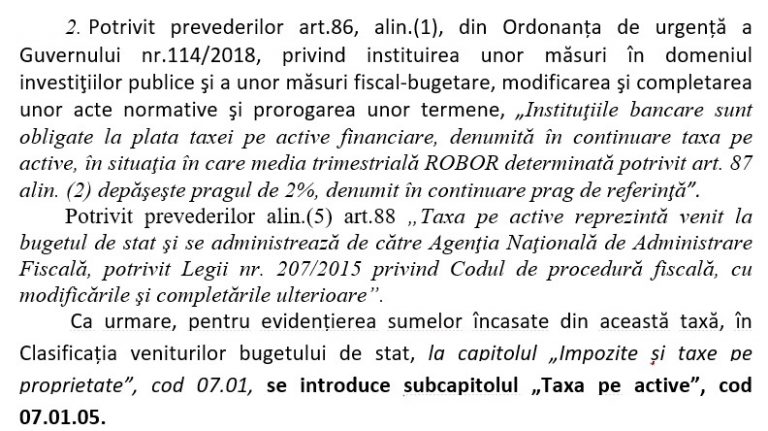 The tax on bank assets was not included in the 2019 draft budget, published on Thursday evening by the Ministry of Public Finance (MFP). According to internal documents of the institution, a series of steps have already been started to include this tax.
The tax on bank assets was not included in the 2019 draft budget, published on Thursday evening by the Ministry of Public Finance (MFP). According to internal documents of the institution, a series of steps have already been started to include this tax.
On January 22, Ioana Burla, General Director of Budget Policy Synthesis General Directorate, issued a communication on „changes in the classification of public finance indicators”, which provides for the introduction of the code associated to the tax on assets.
„As a result, in budget revenue classification, chapter <<Taxes and property taxes>>, code 07.01, subchapter <<Tax on assets>>, code 07.01.05 has been added in order to emphasize the amounts collected from this tax,” reads the document.
- According to Art 86 provisions, paragraph (1) from Emergency Ordinance 114/2018 on implementing measures in the field of public investments and fiscal budgetary measures, as well as amending normative acts and extending certain deadlines, “Banking institutions are liable to pay the tax on financial assets, named the tax on assets, if ROBOR quarterly average calculated based on Art 87, paragraph (2) exceeds 2%, named reference threshold”
According to Art 88, paragraph (5), “Tax on assets represents budget revenue and is administered by the National Agency for Fiscal Administration, based on Law 207/2015 on Tax Procedure Code, with later supplementations and amendments”.
Consequently, for emphasizing the amounts collected from this tax, in budget revenue classification, chapter “Taxes and property taxes”, code 07.01, subchapter “Tax on assets”, code 07.01.05 has been added.
This code is missing from the draft published by the Ministry of Finance.
Also, the Fiscal-Budget Strategy for 2019-2021 shows that the impact of introducing this tax has not been considered in forecasting the revenues.
„As of January 1, 2019, Government Emergency Ordinance 114 / 2018 introduced the tax on financial assets of credit institutions, whose potential impact was not included in the budget revenue projection,” the document states.
Government sources tell that the final form of the tax on bank assets is currently being negotiated.
The „tax on greed” introduced by Government through OUG 114 provides for progressive quarterly taxation of bank assets if ROBOR level exceeds 2%.
„ROBOR quarterly average is based on ROBOR rates at 3 and 6 months calculated and published by the National Bank of Romania for the last quarter/semester proceeding the calculation quarter. The quarterly average is established by the National Commission for Strategy and Prognosis and published on the website of this institution”, the Ordinance says.
The tax on assets rates are applied as follows: if ROBOR quarterly average does not exceed by more than 0.5 percentage points the threshold, the quota is 0.1%; if ROBOR quarterly average is by 0.51 to 1 percentage point above the reference threshold, the share is 0.2%; if ROBOR quarterly average is by 1.01 to 1.5 percentage points above the reference threshold, the share is 0.3%; if ROBOR quarterly average is by 1.51 to 2.0 percentage points above the reference threshold, the share is 0.4%; if ROBOR quarterly average exceeds by more than 2 percentage points the benchmark, the tax on asset rate is 0.5%.










